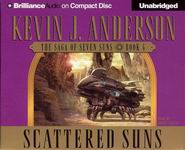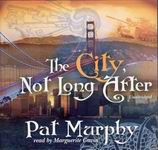
 Soldier of the Legion
Soldier of the Legion
By Marshall S. Thomas, performed by a full cast
MP3 Download – [AUDIO DRAMA]
Publisher: Timberwolf Press
Published: 2002
Themes: / Science fiction / Military / Space opera / Aliens / War
“Dat Spitz fight lak hell,” said Perrault…
“An’ dat Buck fight lak two hells,” was Francois’s answer.
— Jack London’s Call of the Wild
War is hell. Ever since Sherman put it so precisely, the rest of us have been forced to merely tip our hats and let the matter rest. Then along comes Marshall S. Thomas’s Soldier of the Legion which can’t help but pick at this scab. But even if comparing war to hell weren’t a holey sock at the beginning of the book, it would be by the end of it. Every time the slightest skirmish breaks out (which is roughly every other chapter), out trots the tired old dog of hell (Cerberus, a holdover from when the Greeks ran the place) to do his duty.
The opening hellish battle is a perfect encapsulation of the kind of mindless action and equally mindless discussion the rest of the audio play offers, proceeding from lurid descriptions of made-up, inexhaustible weapons to the effects of those weapons on the human bodies of the irredeemably evil bad guys (the Systies). Blood splatters, it sprays, it explodes, it flows, it gushes. Sometimes gore does, too, but mostly it’s blood, blood, blood. Then nearly naked women appear, and the hero tries to contain his drool and his bullets as an embarrassingly unconvincing argument breaks out among the blond-haired, blue-eyed heroes.
The rest of the book is exactly the same, with each breakout of violence a laughable attempt to supersede the hell of the previous engagement. The troops fly to another planet, kill dinosaur-like aliens in a deep cave (double hell), save and kill primitive peoples, return to a settled world to “spy” ineptly and engage in a covert operation that plays out as stealthily as a frontal assault (hell squared), and then return to a primitive planet to battle an even worse enemy than they first thought (hell convolved with hell). But it is all just a repetition of the first chapter. In between battles, there will be awkward, pointless conversations; breasts naked and otherwise that the hero will fall in “love” with; love scenes that consist of people telling each other how much they love each other and will die and/or kill for each other; and sexless sex scenes that dither about without titillation or consummation. All acted with a style reminiscent of that seen in movies where people get paid more for how they look without clothing than for how they emote. It’s uncomfortable enough to make you actually look forward to the empty-headed shooting.
Add to this an unthinking first-person narrator called “Thinker” and the attempted multiple use of the adverb “scarily” without ironic intent, and you have a brackish, gritty brew. The story ends, after its single interesting set-piece, with our heroes literally hanging from a cliff over (you guessed it) hell, but I would rather be tasered than be forced to listen to the sequel. This book is like a live grenade: If it comes at you, get the hell out of the way!
This book is available at Timberwolf Press on Audio CD and MP3-CD, or from Audible.com as a download.
Posted by Kurt Dietz
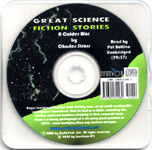
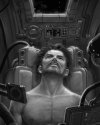

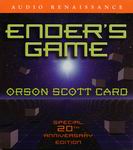
 Ender’s Game: Special 20th Anniversary Edition
Ender’s Game: Special 20th Anniversary Edition